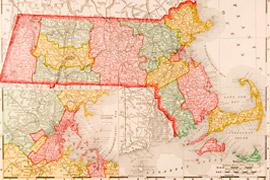March 10th, 2016
State Limits — Care Without Boundaries
Elizabeth Donahue, RN, MSN, NP-C
Despite the fact that Ellen and I have the same level of education and have passed the same national certification exam, Massachusetts has licensing restrictions that she is not subject to when her commute takes her 30 minutes in an opposite direction. While there are different licensing and regulatory statutes in many states across the country, those in Massachusetts are among the most outdated and restrictive. As had happened a number of times before, I was in the midst of a conversation that reminded me of how my home state’s restrictions limited my practice, as well as patients’ access to care. Normally I save chats about state politics for light cocktail party conversation, but since there are pending policy changes currently being considered by the Massachusetts legislature, it seems both timely and important to share both the facts about the regulations and my perspective as a person practicing in the current environment.
 One of the current regulatory restrictions mandates that advanced practice nurses are subject to the oversight of both the state board of nursing and the state board of medicine, a model known as joint promulgation. Massachusetts is one of only a handful of states in the country that requires medical colleagues to oversee matters specific to the practice of APRNs.1 Massachusetts also currently mandates advanced practice nurses to enter into practice agreements with physicians deemed their “supervisors,” including retrospective review of the prescriptive practice of NPs. There are no data that suggest that these regulations are needed to ensure safe care. Nurse practitioner practice has undergone years of study, and outcomes and patient satisfaction data indicate equitable care.2
One of the current regulatory restrictions mandates that advanced practice nurses are subject to the oversight of both the state board of nursing and the state board of medicine, a model known as joint promulgation. Massachusetts is one of only a handful of states in the country that requires medical colleagues to oversee matters specific to the practice of APRNs.1 Massachusetts also currently mandates advanced practice nurses to enter into practice agreements with physicians deemed their “supervisors,” including retrospective review of the prescriptive practice of NPs. There are no data that suggest that these regulations are needed to ensure safe care. Nurse practitioner practice has undergone years of study, and outcomes and patient satisfaction data indicate equitable care.2
Evidence does exist, however, to suggest that loosening of these unnecessary regulatory restrictions will increase access to and quality of care for patients in Massachusetts as well as solve other issues facing health care at this critical juncture. The Institute of Medicine produced a report in 2010 entitled, The Future of Nursing: Leading Change, Advancing Health. The report recognized the size and potential scope of the nursing profession as assets in achieving the goals set forth by the Affordable Care Act, but also acknowledged that barriers existed; therefore, the number one recommendation of the IOM Committee that authored the report was that “nurses should practice to the full extent of their education and training.”3 Massachusetts is not immune to a shortage of access to primary care, with the majority of counties asking patients to wait more than a month for an appointment and most of Western Massachusetts with an average wait time upwards of 100 days.4 Finally, we are living in a time of escalating health care costs in which innovative practice models are being suggested to improve access and care while containing the ballooning costs of basic health care. Utilization of nurse practitioners as primary care providers, which was made legal in Massachusetts in 2008, has been studied as a possible cost savings measure as well. Studies have shown that states with less restrictions and more access have fewer emergency room visits and may produce lower prices in care and a cost savings to Medicare of up to twenty six percent.5,6
 Given the preponderance of cost, safety and satisfaction data, it remains difficult to comprehend why there is opposition to this change in regulations. It is clear to me that my actual practice will not be affected — I will still carry my own licenses for practice and prescriptive authority, and ultimately my own liability for my clinical decisions. This regulatory change would reduce the administrative burden for physician colleagues currently being asked to supervise a practice that has already been shown to be safe and effective. My training has and will remain the same, I will continue to enjoy collaborating with my respected physician and nurse colleagues when I feel a clinical situation calls for it, but not because I am regulated to do so, because I care about my patients and their health. This is simply a change in language for Massachusetts that will position nurse practitioners to continue to care for patients in their communities without unnecessary burdens from a regulatory perspective. There are several national and local organizations that agree this would benefit patients, such as The Institute of Medicine, The Federal Trade Commission, and, most recently, the Massachusetts Health Policy Commission. When speaking about recommendations the Commission made at the Annual Cost Trends Hearing in October 2015, deputy director John Auerbach was quoted as saying: “here’s the bottom line: Massachusetts has among the most restrictive laws in the nation,” and he added that the laws were preventing patients from getting the care that they needed.7
Given the preponderance of cost, safety and satisfaction data, it remains difficult to comprehend why there is opposition to this change in regulations. It is clear to me that my actual practice will not be affected — I will still carry my own licenses for practice and prescriptive authority, and ultimately my own liability for my clinical decisions. This regulatory change would reduce the administrative burden for physician colleagues currently being asked to supervise a practice that has already been shown to be safe and effective. My training has and will remain the same, I will continue to enjoy collaborating with my respected physician and nurse colleagues when I feel a clinical situation calls for it, but not because I am regulated to do so, because I care about my patients and their health. This is simply a change in language for Massachusetts that will position nurse practitioners to continue to care for patients in their communities without unnecessary burdens from a regulatory perspective. There are several national and local organizations that agree this would benefit patients, such as The Institute of Medicine, The Federal Trade Commission, and, most recently, the Massachusetts Health Policy Commission. When speaking about recommendations the Commission made at the Annual Cost Trends Hearing in October 2015, deputy director John Auerbach was quoted as saying: “here’s the bottom line: Massachusetts has among the most restrictive laws in the nation,” and he added that the laws were preventing patients from getting the care that they needed.7
Ultimately, these proposed changes are not about my personal satisfaction as a clinician, or about Ellen’s commute. They are integral to ensuring that patients have access to and enjoy the benefits of high-quality health care wherever they live and from whichever licensed, qualified provider they choose.
- http://campaignforaction.org/resource/ma-action-coalition-report-advanced-practice-nurse-massachusetts
- Newhouse, Robin P. et al. “Advanced practice nurse outcomes 1990-2008: a systematic review.” Nursing Economics 29.5 (2011): 1-21.
- Institute of Medicine. (2010). The future of nursing: Leading change, advancing health. Retrieved from http://books.nap.edu/openbook.php?record_id=12956&page=R1
- http://www.massmed.org/News-and-Publications/Research-and-Studies/2013-MMS-Physician-Workforce-Study/#.VOIG-tLF_84
- Traczynski, Jeffrey and Victoria Udalova. “Nurse Practitioner Independence, Health Care Utilization, and Health Outcomes.” Working paper, 2014. As of March 3, 2016: http://www2.hawaii.edu/~jtraczyn/paperdraft_050414_ASHE.pdf
- Perloff, Jennifer, Catherine M. DesRoches, and Peter Buerhaus. “Comparing the Cost of Care Provided to Medicare Beneficiaries Assigned to Primary Care Nurse Practitioners and Physicians.” Health Services Research, (2015): 6. http://onlinelibrary.wiley.com/doi/10.1111/1475-6773.12425/abstract
- http://www.mcnpweb.org/news/news.asp?id=255697

; [/php]/images/AU000_edonahue.jpg)

Elizabeth – I think you hit the nail on the head, patients have the right to choose the care that all APRNs are offering, the data supports the care is safe, cost effective and accessible!
Stephanie – thanks for reading and engaging in the discussion!
Wow. On board with being able to access the best care and great practitioners like you. Sometimes(too often) the law goes too far. Hate that we put caution before common sense
Thanks for this piece! I am an NP practicing in NC, with similarly restrictive laws requiring physician supervision. I think you exercised some restraint in not pointing out that these laws arise from a desire among some physicians to protect their turf. Clearly there are also many physicians who support collaborative practice with NPs and would support the increased access and possible cost savings that would come with more autonomous practice.
I appreciate what you’ve written and am glad you are reaching the Physician’s First Watch audience!
Working side by side with NPs has shown me how they have much to contribute to patients and providing care to people that may otherwise have none. Especially with the experienced NPs who have a lot to offer newly practicing nurses or doctors, they make a vast difference not only in people’s lives, but others who learn from them as well. Having severe restrictions on NPs in certain states limits their ability to practice in underserved locations and can be detremental in providing access to patients in need.